72 Days in the NICU, a Lifetime of Hope: Luka’s Journey.1847
Luka’s Journey: From Fragile Beginnings to a Future Full of Hope
When Ben and Sofija first dreamed of becoming parents, they imagined the simple joys most families do—the first cry in the delivery room, the quiet bliss of holding their baby, the long nights of rocking him back to sleep. They never imagined that their journey would begin with surgery, fear, and months inside a neonatal intensive care unit.
Their son, Luka, entered the world facing a challenge that very few people have even heard of: gastroschisis. It is a rare and terrifying condition, one where a baby’s intestines develop outside of the body. For parents, hearing those words is like having the air sucked from the room. What should have been a moment of celebration became the beginning of an uphill battle.
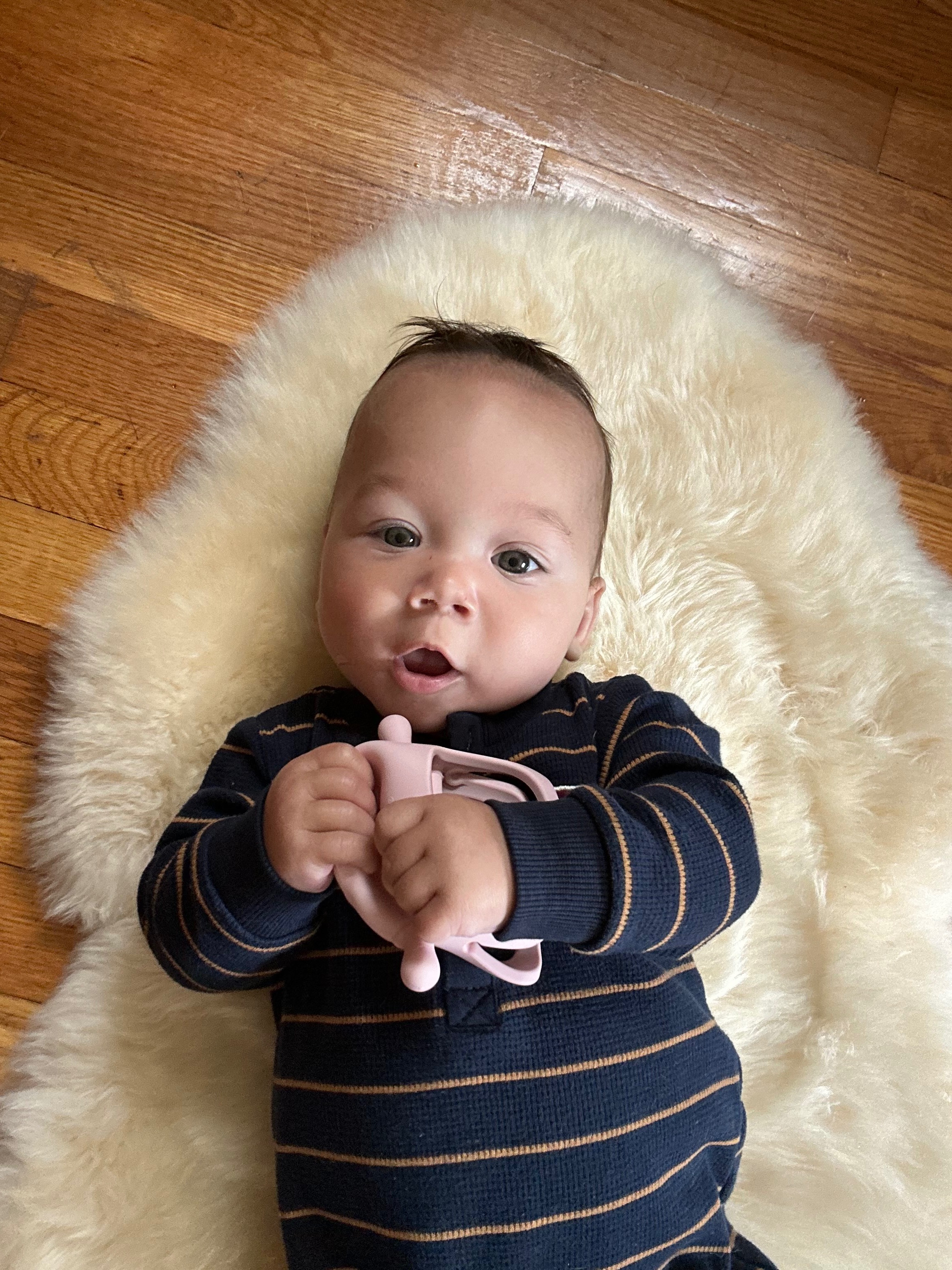
On his very first day of life, tiny Luka was wheeled into surgery. Surgeons worked carefully, delicately, to place his organs back where they belonged. That single surgery was only the start of a long journey—one that would test Luka’s fragile body and his parents’ courage again and again.
For 72 days, Luka’s first home was not a nursery filled with lullabies and soft blankets, but the Neonatal Intensive Care Unit at Barbara Bush Children’s Hospital in Portland, Maine. Those days blurred together for Ben and Sofija—days filled with monitors beeping, hushed conversations with doctors, long hours of waiting and wondering, and countless prayers whispered into the sterile air.
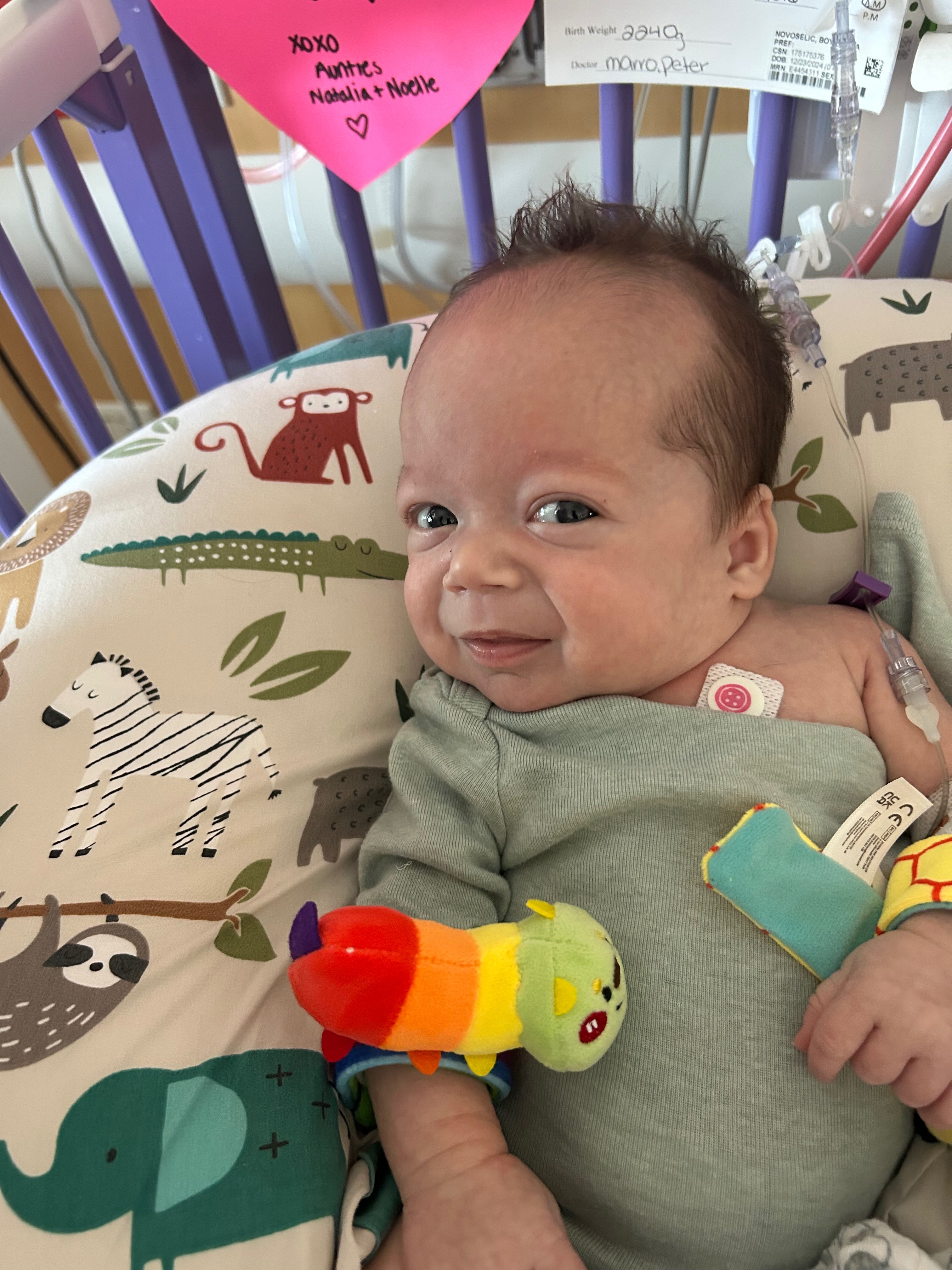
There were setbacks that felt unbearable. Nights when Luka’s fragile body seemed too weak to keep going. Phone calls that no parent ever wants to receive. And yet, there were also moments of victory—small steps that meant everything in that place.
The first time Luka breathed without a tube. The first successful feeding. The first smile that lit up his face, even under fluorescent hospital lights. And then, the moment that Sofija and Ben will never forget—the first time they held their baby without wires and machines surrounding him.
Every milestone was a battle hard-won. Every ounce of progress was celebrated with tears, laughter, and gratitude.
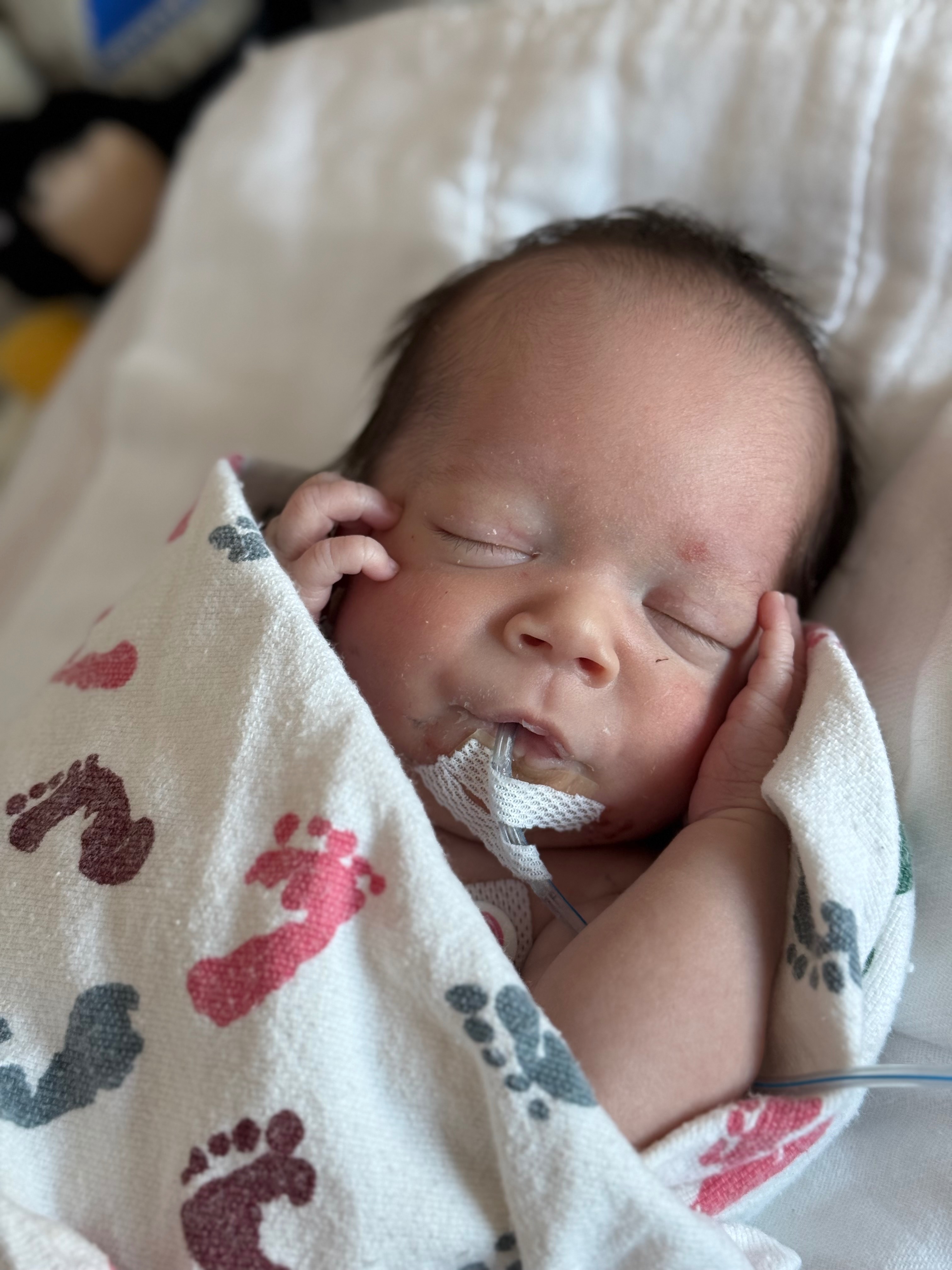
The NICU team became family. Doctors, nurses, and staff treated Luka as though he were their own. They stood watch through long nights, comforted Ben and Sofija through moments of fear, and celebrated every victory with the same joy as the parents themselves. For families in the NICU, medical care is only part of the story—the compassion of those who walk beside them becomes the difference between despair and hope.
And Luka? He proved himself to be a fighter from the very beginning. Tiny, fragile, but filled with a strength that no one could deny.
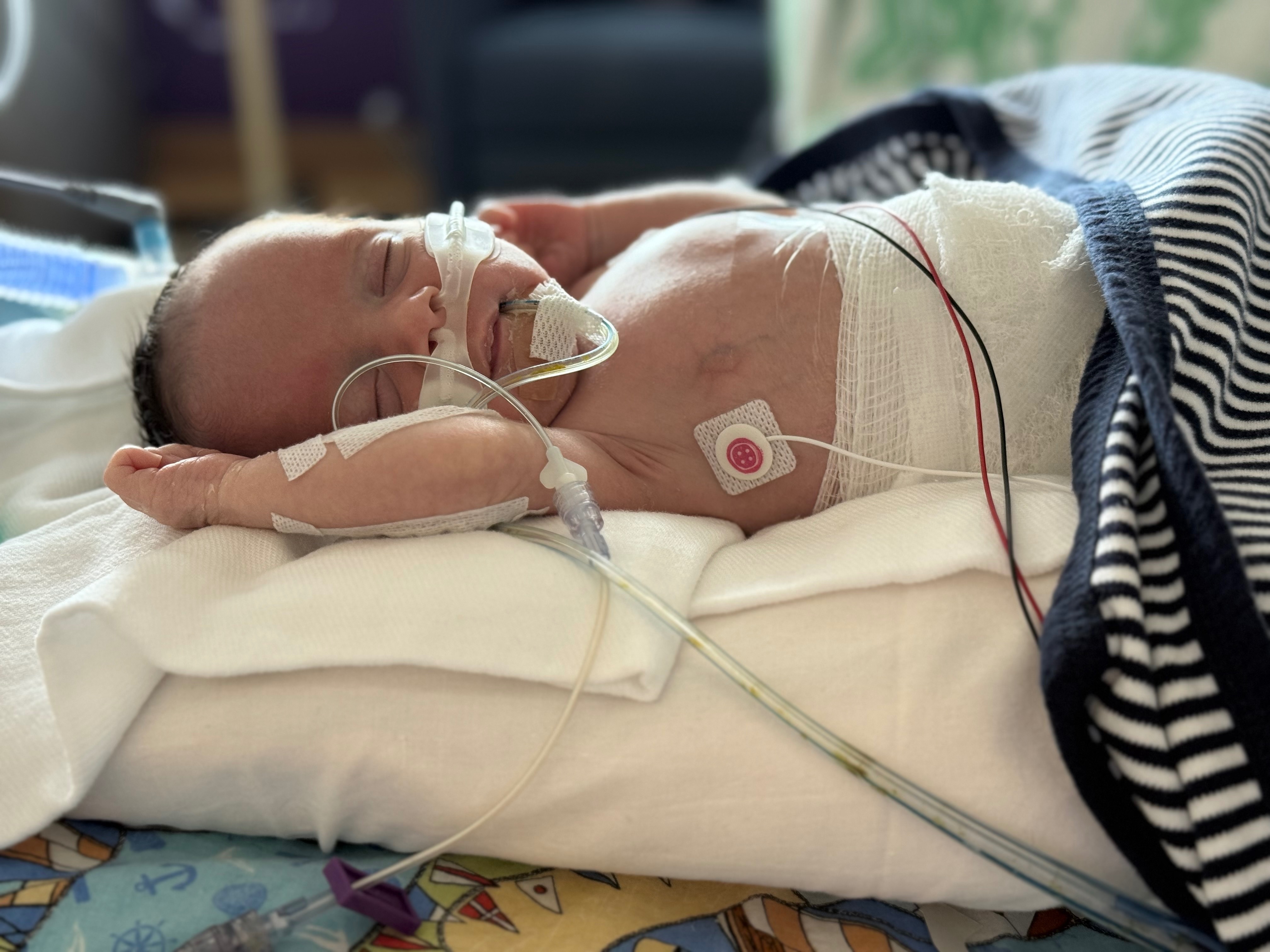
Seventy-two days after his birth, Luka was finally strong enough to leave the hospital. When Ben and Sofija carried him through those doors, they carried more than just their son. They carried the weight of everything they had endured, and the immeasurable gratitude of being able to go home as a family.
Today, Luka is 8 months old. He is thriving. He laughs often, flashes smiles so big they light up the room, and meets every milestone with the determination that has defined his journey since birth. To look at him now, you would never guess how hard he fought to get here.
But while Luka’s story is one of triumph, it also carries a heavy burden. The long NICU stay, the surgery, and the relentless medical care left Ben and Sofija with $42,000 in medical bills. For any family, that number is overwhelming. For a young family just starting out, it can feel crushing.
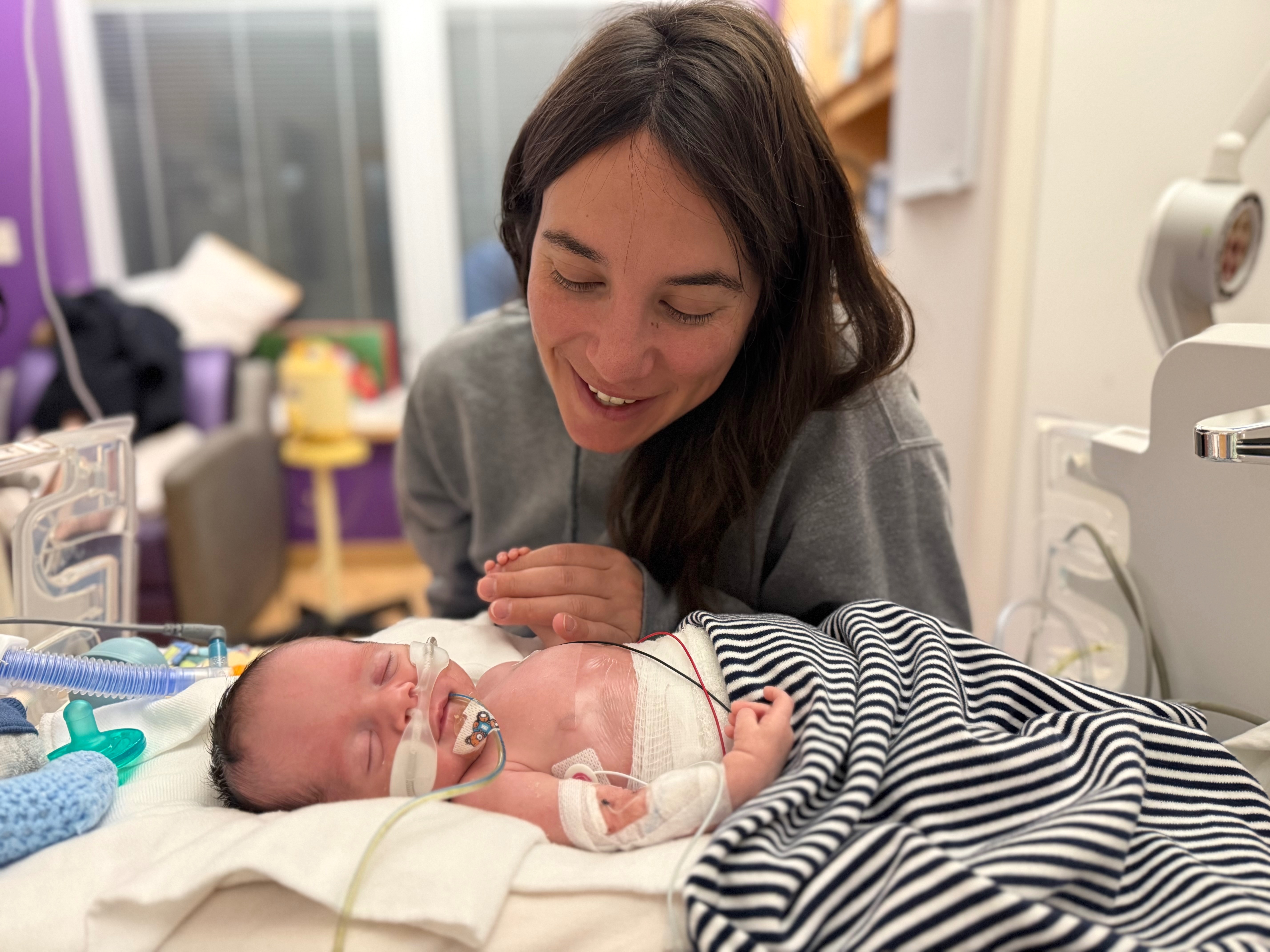
And yet, they would never trade any of it. Because every bill, every sleepless night, every moment of fear led to this moment—holding their healthy, happy little boy in their arms.
Now, friends and loved ones are stepping forward with a GoFundMe campaign. Not because Luka’s story is tragic, but because it is hopeful. Because this is not just about helping pay down bills—it’s about lifting a burden so that Ben and Sofija can focus fully on what matters most: raising their son, cherishing every smile, every giggle, every new step in his unfolding life.
This is a family who has already endured the unimaginable. They have already proven their resilience. What they need now is a community to come alongside them and say, “You are not alone. We see your fight, and we want to help carry the weight.”
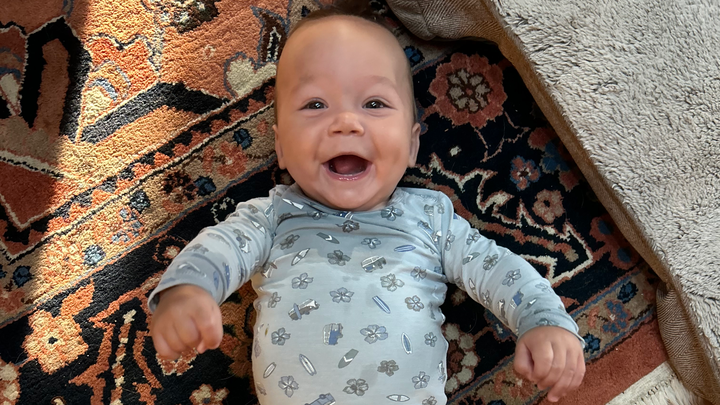
Every contribution—big or small—makes a difference. Every share of Luka’s story spreads hope a little further. For those who can give, the gift is not just financial support—it is a message of solidarity, of compassion, of love.
Because Luka’s story is not just his family’s story. It is a reminder to all of us of how fragile life can be, how fierce love can become in the face of hardship, and how deeply communities can rally when someone is in need.
At just 8 months old, Luka has already shown the world what it means to fight. His laughter is proof that even the hardest beginnings can lead to the brightest futures. His story is one of resilience, of hope, and of the power of love to overcome even the most daunting of challenges.
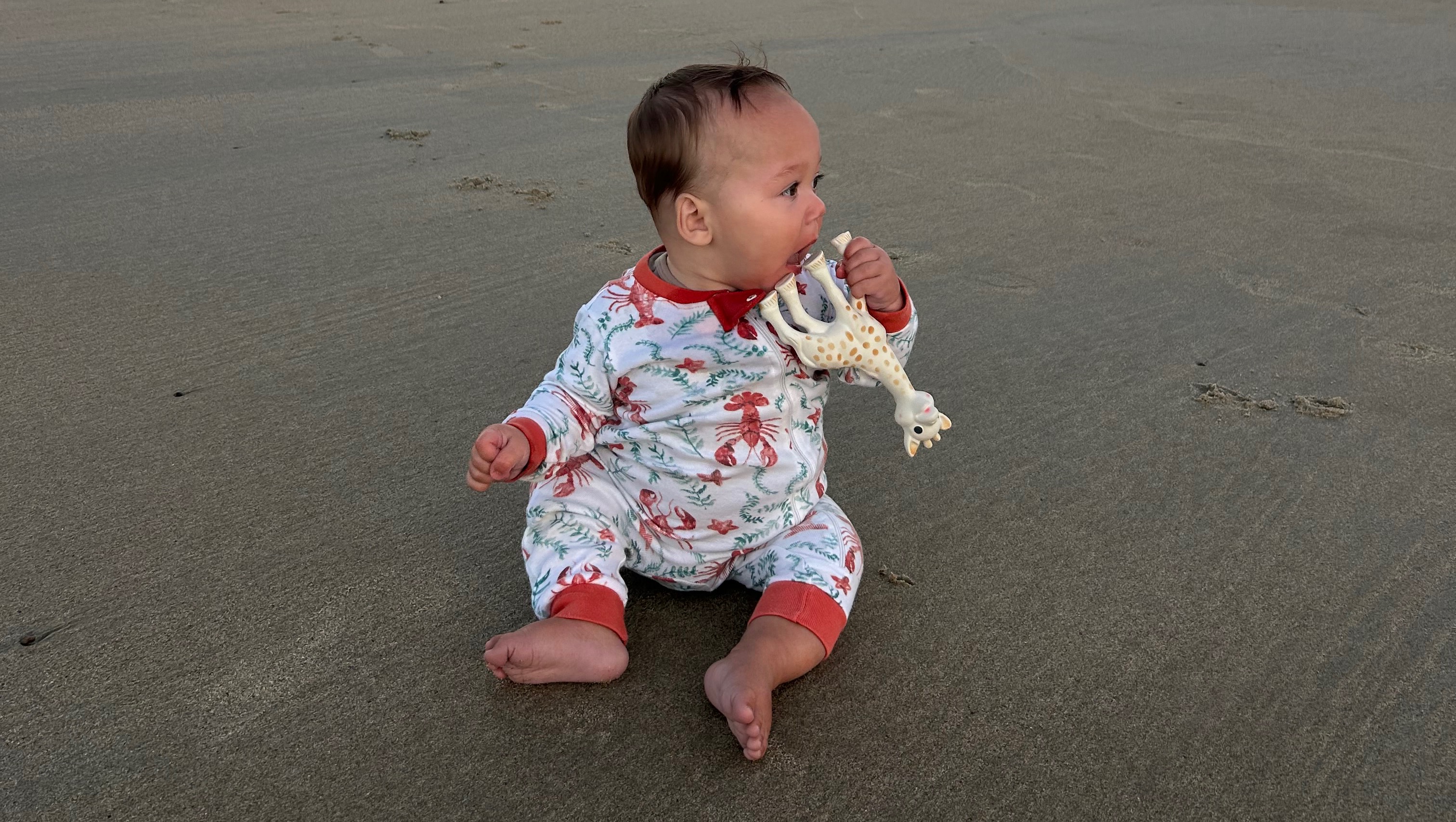
Ben and Sofija hold him close every day, grateful for the miracle that he is. They remember the fear of those first nights, the tears shed at his bedside, the prayers whispered in desperation. And then they look at him now—healthy, joyful, strong—and they know that every moment was worth it.
For those who hear Luka’s story, may it serve as a reminder: miracles are not always sudden or grand. Sometimes they come slowly, day by day, through the strength of a baby’s heartbeat, the courage of parents who refuse to give up, and the kindness of a community that surrounds them.

And so, this is Luka’s story. From a fragile beginning to a life full of promise. From a NICU bed to the safety of home. From fear to joy.
His journey is proof that even when life begins with heartbreak, it can blossom into something beautiful.
And now, we all have the chance to be part of his story—by lifting his family, easing their burden, and helping ensure that Luka’s future is not weighed down by the cost of his survival, but carried forward by the love and generosity of those who believe in him.
A Morning of Laughter Turned to Tragedy: Honoring the Lives of Bebe, Elsie, and Alice.4107

The classroom was alive with music, laughter, and the innocent energy that only children can bring. Little girls twirled and spun to the beat of Taylor Swift’s “Shake It Off,” their hair bouncing, ribbons flying, and shoes tapping against the floor. Each movement was a celebration of life, a small universe of joy contained within the walls of the room. Teachers watched with fond smiles, clapping along, joining the children in their happiness. It was a scene of pure, unfiltered delight, a morning that promised nothing but sunshine and smiles.

Among the children were three bright lights who shone with particular brilliance. Bebe King, just six years old, radiated joy wherever she went. Her laughter was contagious, a melody that lifted spirits in seconds. She loved sunshine, playing outside, and dreaming big, always with her older sister Genie by her side. Genie often described Bebe as a “little sunshine,” a child whose laughter could warm even the coldest hearts.

Elsie Dot Stancombe, seven years old, was the soul of the classroom. She had a way of noticing when someone was sad and would instantly find a way to make them smile. Her caring nature extended to her friends, teachers, and even the younger children in the school. Elsie had a spark in her eyes that seemed to promise that she would grow up to make the world a better place, one small act of kindness at a time.

Alice da Silva Aguiar, nine, carried herself with a grace unusual for someone her age. She had dreams that stretched far beyond her years, imagining worlds where creativity, empathy, and courage shaped the lives of those around her. She was kind, patient, and fiercely intelligent, always ready to help others and share her insights. Alice’s teachers often spoke of her potential, marveling at the maturity and empathy she displayed daily.
Then, in a moment, everything changed.

A man entered the classroom, and the atmosphere shifted from music and laughter to shock and terror. The sound of the knife cutting through the air was accompanied by screams, panic, and confusion. Children froze, some crying, some trying to hide. Teachers instinctively tried to shield their students, placing themselves in harm’s way, their voices pleading for calm amidst the chaos.
The scene was one of unimaginable horror. Ten people were injured in those moments, bodies scattered across the room, the innocence of the morning shattered irreparably. Among them, three little girls would not survive: Bebe King, Elsie Dot Stancombe, and Alice da Silva Aguiar.

Bebe’s sister Genie escaped, but the trauma she carries will be with her forever. She remembers Bebe’s laugh, the way her little fingers would curl around hers when they held hands, and the way her sister’s eyes sparkled when she danced. Genie’s memories are filled with light that was extinguished too soon, a presence that will always linger in her heart.
Elsie Dot Stancombe’s absence left a silence in the classroom that could never be filled. Her classmates remembered her smile, the gentle encouragement she gave to everyone, and the laughter that could turn a frown upside down. Teachers and friends alike struggled to reconcile the bright, caring girl they knew with the void left behind. Her life, though brief, was a testament to compassion, empathy, and joy.

Alice da Silva Aguiar’s death was felt not only in the classroom but across the wider community. Her dreams, ambitions, and intelligence had only begun to blossom. Teachers recalled her thoughtful questions, the books she loved, and the gentle way she approached every task. Alice was already demonstrating the leadership and kindness that would have carried her far in life. Her potential was immense, yet the world would never see it fully realized.
The immediate aftermath was a blur of sirens, frantic calls, and tearful parents rushing to the scene. Emergency responders worked tirelessly to tend to the injured, to comfort the terrified, and to restore order amidst the chaos. But no amount of heroism could reverse the loss of those three precious children. The classrooms, hallways, and playgrounds that had once been filled with laughter now echoed with grief and shock.

Families were thrown into unimaginable pain. Parents, siblings, and friends struggled to comprehend how a normal morning could end in such tragedy. Each of the girls left behind stories, dreams, and a unique presence that could never be replaced. Friends shared memories of Bebe’s bright laughter, Elsie’s acts of kindness, and Alice’s graceful intelligence. In classrooms and homes, their absence was felt like a physical weight, a reminder of the fragility of life.
The wider community came together in mourning. Vigils were held, memorials established, and support poured in from people near and far. Yet, amid the grief, there was also a determination to remember the children not for the way they died but for the way they lived. Stories of their laughter, their generosity, and their passions were shared endlessly, keeping their spirits alive in the hearts of everyone who knew them or heard of their lives.

Bebe’s love of sunshine and joy became a symbol for her community, a reminder that even in the face of darkness, brightness can endure. Elsie’s caring nature inspired initiatives in schools to encourage kindness and empathy, turning her memory into a living legacy that could continue to impact others. Alice’s dreams, though unfulfilled, became a beacon for other children, a reminder to pursue one’s ambitions with courage and grace.
Genie, Bebe’s sister, became a quiet emblem of resilience. Carrying the memory of her sister, she vowed to honor Bebe’s life by embracing joy, spreading laughter, and cherishing every moment. Families of the other girls worked to create scholarships, art programs, and community projects in memory of Elsie and Alice, ensuring that their lives continued to influence the world even in absence.

The tragedy also sparked a broader conversation about safety, mental health, and awareness in schools. Educators and policymakers grappled with how to protect children, prevent such violence, and provide support for those affected. While the pain of loss could never be fully mitigated, efforts were made to create environments where children could grow, play, and learn safely, honoring the memory of those who were lost.
Bebe, Elsie, and Alice were not defined by their deaths. They were celebrated for their laughter, their kindness, and the love they shared with the world. Their stories were retold in classrooms, at family gatherings, and in the hearts of those who knew them, a reminder that even the briefest lives can leave indelible marks. Their spirits continued to inspire courage, empathy, and joy in those who carried their memory forward.

In the years that followed, memorials for the three girls became spaces of reflection and hope. Families, teachers, and students shared stories of the girls’ unique personalities, their small but impactful actions, and the joy they brought to everyday life. Through these acts of remembrance, Bebe, Elsie, and Alice’s presence remained tangible, a reminder that love and kindness endure even after loss.
Though their lives were tragically cut short, the legacies of Bebe King, Elsie Dot Stancombe, and Alice da Silva Aguiar live on. They are remembered not for the horror that took them but for the light they brought into the lives of everyone they touched. In laughter, in art, in music, and in acts of kindness, their spirits continue to shine, inspiring generations to come.

Their story reminds us that life is precious, fragile, and infinitely valuable. It teaches that even in the darkest moments, the light of love, joy, and compassion can prevail. Through memory, action, and shared stories, the lives of these young girls continue to matter, proving that even in tragedy, hope and humanity endure.
Bebe, Elsie, and Alice were more than victims of violence. They were children full of potential, light, and dreams. And though the world lost them too soon, the mark they left behind — laughter, kindness, grace — continues to ripple outward, touching lives and reminding us all of the extraordinary impact one life, however brief, can have.





